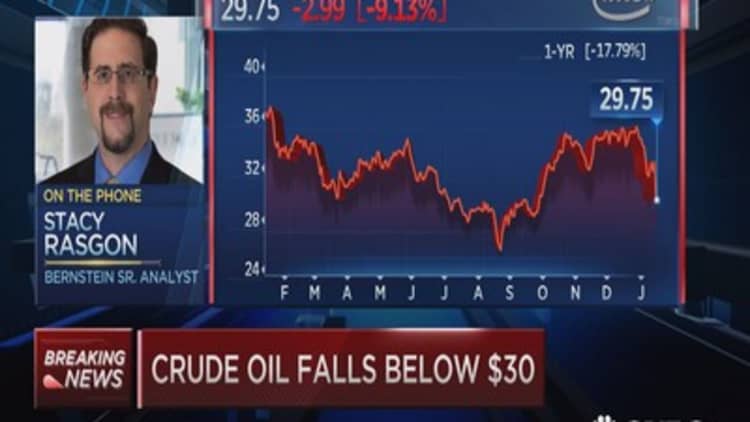China is the world's biggest country, second-largest economy and top nation for smartphone sales. It's also driving tech investors crazy.
Economic growth is slowing faster than many experts expected. Add to that uncertainty surrounding when and to what degree the Chinese government will weaken its currency to boost exports.
Just as China is becoming an increasingly crucial market for U.S. tech companies, its volatility is making future earnings hard to predict. As the Nasdaq closes out its worst month since the 2008 financial crisis, down 10 percent as of Thursday's close, China is on everyone's lips.
In reporting fourth-quarter results, tech companies — particularly Apple — couldn't avoid it. The most valuable company in the world counts on China for about one-quarter of iPhone sales.
"We began to see some signs of economic softness in Greater China earlier this month, most notably in Hong Kong," CEO Tim Cook said on the company's fiscal first quarter earnings call.
Cook said Apple's expansion plans haven't changed and that its retail operations are growing from 28 to 40 stores in the region. Revenue there increased 14 percent to $18.4 billion, and Cook said, "we remain very bullish on China."
Still, investors were concerned. The stock fell 6.6 percent following the report, as Apple came up short on revenue estimates.

Intel's comments two weeks ago were even more disconcerting.
"Our team on the ground in China has gotten fairly cautious about what's going on in China right now," Stacy Smith, chief financial officer of the world's largest chipmaker, said on the fourth-quarter call.
And in CEO Brian Krzanich's words: "While our outlook for the first quarter reflects some caution about overall demand, particularly in China, we continue to expect solid growth in the business in 2016."
Despite beating estimates on revenue and earnings, the stock slumped more than 9 percent. China is the world's largest PC market.
IBM highlighted growth in just about every international market except China. In Asia-Pacific, "we had double-digit growth in India and Australia, though China declined," CFO Martin Schroeter said on Jan. 19.
EMC, which has agreed to be acquired by Dell, said Wednesday its results in the Asia-Pacific region "would have been positive were it not for the Chinese impact."
As is, revenue was flat from a year ago.
"We experienced declines in our business in China as the country faced issues with their equity and housing markets that lead to a lowering of IT imports," CEO Joseph Tucci said.
Facebook was the notable exception among the tech giants. While the social network isn't active in China as a consumer website or mobile app, the country is one of Facebook's larger advertising markets for companies looking to build a global audience.
Facebook's overall revenue growth of 52 percent blew past estimates. China only came up once on the call, but it was all investors needed to hear.
"We're also pleased with the growth we're seeing in emerging markets in countries like China, where businesses are advertising on Facebook and Instagram to reach people internationally," Chief Operating Officer Sheryl Sandberg said.
The stock soared 16 percent.
Neither Amazon.com nor Microsoft had much to say about China on their calls on Thursday, though Microsoft took a significant earnings hit due to the strength of the dollar. Alphabet reports results on Monday and shouldn't be terribly hurt by China since the Google search engine isn't available there.
The hope — and expectation — among tech executives is that we're just experiencing a blip on a long-term upward slope. The International Monetary Fund still forecasts Chinese expansion of 6.3 percent in 2016, following 6.8 percent growth in 2015.
Or as Apple's CEO spelled out to his investors:
"The middle class in China was less than 50 million people in 2010, and by 2020 it's projected to be about 0.5 billion," Cook said. "We think this provides us a great opportunity to win over some of those customers into the Apple ecosystem."






